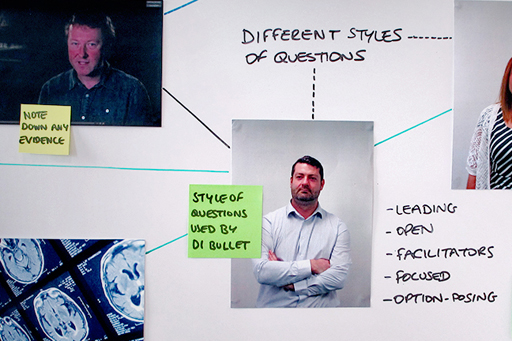1.1 Evaluating the evidence in the interviews

You saw previously that there are different styles of questions, and that the style of question asked has a profound effect not only on the answer given but on what the witness may remember.
To help you evaluate the interviews conducted by DI Bullet, the next activity involves looking at the particular styles of questioning that he used. For each question in the quiz, you will be provided with a question that was used by DI Bullet in the interviews that you heard. Your job is to decide which of four question styles is being used. Identifying the question style will help you evaluate the evidence gained in the interview.
Here is a quick summary of the four question styles to help you with the activity:
Leading questions
These questions tend to strongly suggest what response is expected, and/or assume details that have not been provided by the witness.
Open questions
These questions seek an open-ended response from the witness, and do not limit, focus or direct the witness’s response except in the most general way.
Focused questions
These questions focus the witness’s attention on details or aspects of the event that the witness has previously described. They direct the witness to search their memory for details or aspects of the event that they have mentioned previously.
Option-posing questions
These questions limit the response the witness can give to specific options, and usually focus on aspects of the event that the witness has not already described.
Activity 2 Evaluating DI Bullet's interview questions
a.
A leading question
b.
An open question
c.
A focused question
d.
An option-posing question
The correct answer is a.
a.
Well done. Leading questions suggest what response is expected, and/or assume details that have not been provided by the witness. Here the question assumes that the robbers had shot guns, when no mention of this had been made previously by the witness.
a.
A leading question
b.
An open question
c.
A focused question
d.
An option-posing question
The correct answer is c.
c.
Well done. Focused questions direct the witness to search their memory for details or aspects of the event that they have mentioned previously. The witness has previously stated, 'four men jumped out'.
a.
A leading question
b.
An open question
c.
A focused question
d.
An option-posing question
The correct answer is c.
c.
Well done. Focused questions direct the witness to search their memory for details or aspects of the event that they have mentioned previously. Here the witnesses is being asked to focus on providing information about the car.
a.
A leading question
b.
An open question
c.
A focused question
d.
An option-posing question
The correct answer is a.
a.
Well done! Leading questions suggest what response is expected, and/or assume details that have not been provided by the witness. Here the question suggests both that this particular person was in charge (when the witness had not said this) and that it was his decision to grab Liz (which also had not been stated by the witness).
a.
A leading question
b.
An open question
c.
A focused question
d.
An option-posing question
The correct answer is d.
d.
Well done! An option-posing question limits the response the witness can give to specific options, and usually focuses on aspects of the event which the witness has not already described. Here the question essentially limits possible reponses to either confirm or deny the type of hairstyle, a detail not yet covered by the witness.
a.
A leading question
b.
An open question
c.
A focused question
d.
An option-posing question
The correct answer is a.
a.
Well done. Leading questions suggest what response is expected, and/or assume details that have not been provided by the witness. Here the question assumes that the driver was the leader, that he was big, dressed in army fatigues with an army like hair cut, when no mention of this had been made by this particular witness.
